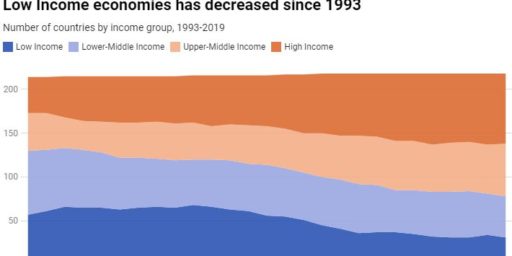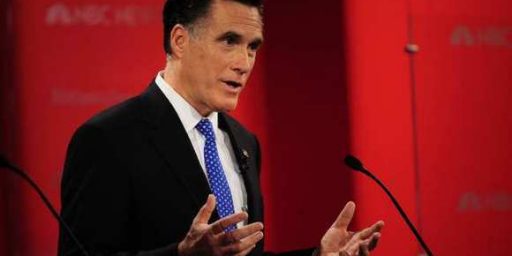What Does It Mean to be Rich?
Ezra Klein posed these questions to his readers and asked for their snap answers:
1) Where in the income distribution do you have fit in order to be called “rich”? I’m looking for a percentile here.
2) What annual income do you have to make in order to be called rich?
Frankly, my off the top of the head answer is simply: that’s not enough information to make a judgment.
To be sure, income certainly plays a role in being “rich”, but it’s not the end-all, be-all. As some of Klein’s commentators pointed out, income versus cost-of-living matters, among other things.
But just looking at income distribution alone simply isn’t enough. In my life, I have met families who make about $50,000 a year who routinely by new cars with cash. On the other end of the spectrum, I know families who make $200,000 a year and yet live paycheck to paycheck as a consequence of debt and/or medical burdens. (Lawyers and doctors, for example, can easily come out of higher education with over $100K in student loan debt–which puts a severe damper in your actual cash on hand.) In addition, the business world (especially the entertainment industry) is filled with people who have millions in income and nevertheless go bankrupt. Are those folks “rich”?
If you were to ask me how to define someone as rich, irrespective of income, my off-the-cuff answer would be that a person is rich if:
(1) At least 20% of one’s monthly after-tax income is directed to savings and investments; and
(2) The value of one’s assets, upon liquidation, would exceed the value of one’s debts by at least 50%.
I am also strongly pondering the addition of a third criteria, which would be: The ability to live for at least one year without any income and without cutting regular living expenses.
I think that these criteria are a stronger indicator of a person’s financial position than simply their income, which by itself doesn’t really tell you if a person is well-off.






I’m not sure about #1. I might suggest something about the percentage of income derived from investments rather than going to investments.
Of course we could debate the basic premise-
by your reckoning someone who make $10 billion a year is not rich so long as they are also impulsive shoppers or terrible money managers. That seems wrong to me. It is one thing if talking about debts incurred in the past, but people who simply choose to spend flipping great wadges of cash are still rich. Buying 37 yachts does not make me *not* rich, even if I really could only afford 36 of them 🙂
I would qualify #1 as 20% being available to be directed to savings and investment. For those making $200k and living paycheck to paycheck, the money isn’t available for saving. They could direct it to savings if the neglected paying their debts, but that wouldn’t make them rich.
I go along with the old Wall Street adage of drop dead money. In essence you are not rich if you do not have enough wealth to tell your employer to drop dead and quit working while continuing to enjoy the standard of living you desire.
Rich is an asset concept, not an income concept. High income can make you feel rich but if your assets can’t support you, your not rich.
The other critical idea left out here is the person’s age. If you can take a year off with your assets at age 25 that’s pretty good. If you can’t do that at age 40 that’s kind of scary.
I don’t agree. The rich have *access* to wealth. What they do with that access is not the issue.
My Father taught me the secret to financial success many years ago. Spend less than you earn. How much I have made has varied. As I get farther in my career I have options on how to structure the compensation (e.g. taking stock in a start-up), but I have lived by that simple rule (including while getting through 9 years of college on my own).
No matter how much you make, if you are spending more than you earn you aren’t rich (e.g. the bankrupt celebrities and the people laden with debt). It may be wise to invest in the future (e.g. educational debt or start up investment), but if you can’t pay off the debt or walk away from the investment, then it has a certain control over your that keeps you from being rich.
Some one consistently spending less than they earn may not be able to buy anything they want, but a lot of people will consider them to be rich (also known as not having money worries).
So I would say if you are satisfied with your lifestyle and consistently spend less than you earn, then you are rich.
I posted on this subject myself not too long ago. I think that “the rich” are characterized by several criteria. First, the majority of their income must be derived from the ownership of assets. Second, the income of the “the rich” must be no less than three standard deviations above average income.
In my post cited above I expand a bit on why this definition makes sense. Defining it solely on the basis of income includes people who really don’t fit comfortably into an intuitive notion of “the rich” e.g. longshoremen. Defining it solely on the basis of the source of income includes people who don’t fit comfortably into an intuitive notion, either, e.g. the non-indigent elderly.
It’s more complex than this, of course, due to regional differences and any number of other factors. But I think it works pretty well as a rule of thumb.
It’s not, however, what Congressmen generally mean when they say “the rich”. As best as I can tell they mean anybody who makes more than a Congressman.
Ah, yes, the Micawber principle:
That has potential but it excludes some I think are pretty damn rich.
Perhaps what we need is not a single definition but a series of modes of richness…
That’s by design. I don’t think that anybody who’s one paycheck away from default (as a remarkable number of people with large dollar salaries are) should be characterized as “the rich”.
Wouldn’t that automatically require the rich to be less than .1% of the population? Assuming a standard distribution 99.8% of all results should be withing 3 deviations of the mean (and half of the .2% remainder would be on the low side). I wouldn’t put the number nearly that low.
#1 and #2 do not define whether one is rich or not, but whether one is frugal or not.
I qualify for both #1 and #2, but am not rich. I just choose to live within my means.
I guess we disagree then. If someone make $10 million a year but spend $9,999,999 a year then I would call them rich. Foolish but rich.
Lets put it this way- the rich may be one check away from default but that’s through their own choices and not necessity. They could easily have had a perfectly adequate car and house and whatever but decided to splurge on something beyond their inflated means.
The distribution of income isn’t normal but, yes. Go check the stats in my post. Three standard deviations may not be as large an income as you may think.
It wasn’t the size of the distribution so much as the miniscule percentage that qualifies as rich. I can’t imagine any qualification of rich that doesn’t include at *least* the top 5%, probably more like the top 10 maybe even 15%.
Your #2 qualification appears to me to be minimal. If you’re mid-career (40s) and couldn’t liquidate, pay off all your debts and have a bunch left you’ve been spending/borrowing way too much.
Tlaloc, you probably need to look a little more closely at what incomes people are making. Some blue collar workers are in the top 15% of households and nearly all doctors of medicine are. Two government workers at GS-12, not a management level, who are husband and wife are in the top 15% of households. That’s not remotely rich.
Tlaloc;
Your comments here, on this topic, are virtually unassailable! Good job of clear thinking.
My income was fluctuated significantly during my adult life, but I don’t think my persepctive of how “rich” I am has changed all that much. Being “rich,” or perhaps more succinctly, being “wealthy” is as noted above about assets, not income. If you run a business and the relative importance of the balance sheet, this becomes ever more clear.
As for a hypothetical to help explain this, if Bill Gates put all his assets into non-interest bearing or non-dividend generating investments would he no longer be rich because he has no income?
Sorry, the words “look at” are missing from the sentence mentioning balance sheet.
“Spend less than you earn” works fine until it meets the other saying- “soak the rich.”